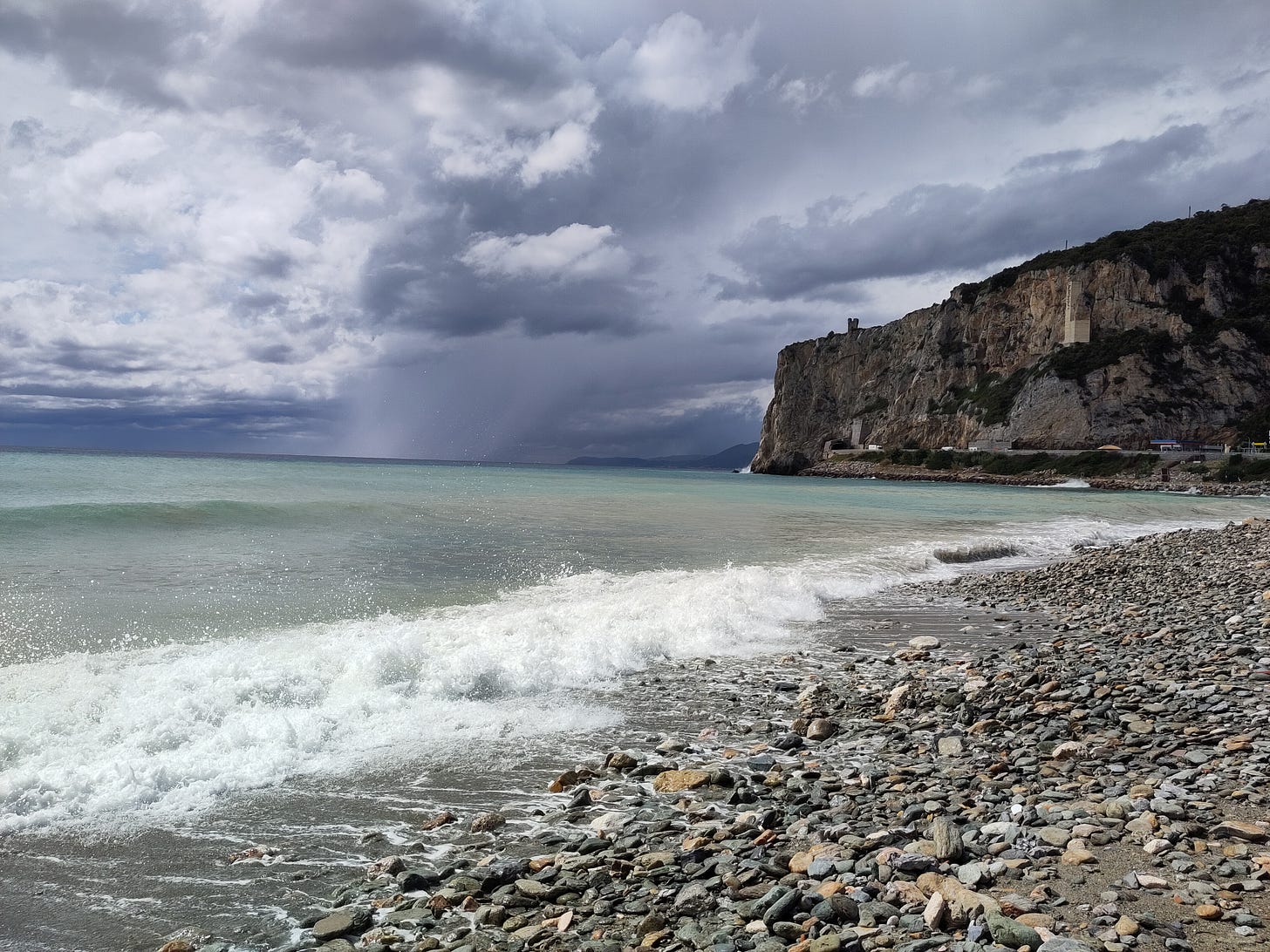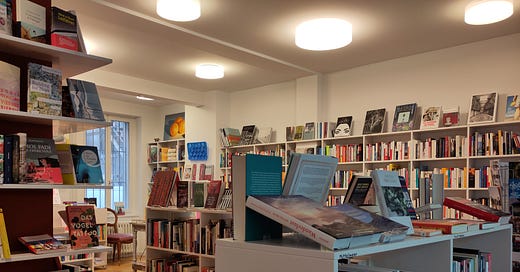Managing a multilingual bookshop
My conversation with Charlotte Nager, co-founder of the Zurich bookshop mille et deux feuilles
The first time I entered the bookshop mille et deux feuilles, Buchhandlung zum Mittelmeer und mehr, I could hardly believe what I saw. A large, welcoming room with neatly labelled bookshelves: Morocco, Algeria, Greece, Spain, Croatia, and so on – but I wasn’t in a travel bookshop. In front of me was a literary tour of countries that border the Mediterranean sea. Better still, I realised that not all books were in German: in fact, many were in the native languages spoken and written in these countries. Besides the happiness of finding something I can actually read and enjoy, curiosity kicked in and questions popped up in my head. What motivated the founders to choose such a unique concept, namely that of a multilingual bookshop on the Mediterranean area? How did the book selection work, especially in view of its multilingualism? In December 2024 I asked if I could interview one of the shop’s owners: I had the pleasure of talking with Charlotte Nager, who founded mille et deux feuilles with Andrea Peterhans. I thank Charlotte for her time and her answers.
When did the bookshop open?
We started in the summer of 2015, but in a smaller place and with reduced opening times. For almost two years we were in a state of test, seeing if we can make it and if there’s enough interest. Above all we realised that a bookshop, for us, needed enough space to organise events and create opportunities for people to meet and talk. Then we found this bigger place and stayed here ever since.
How many languages do you have in the bookshop?
We have Spanish, French, Italian, Slovenian, Croatian, Bosnian, Serbian, Albanian, Greek, Turkish, Hebraic, Arabic, one book in Maltese – and then German and English. It’s very difficult to find books in some of these languages: for French, Italian and even Arabic it’s quite easy, but for languages like Albanian, Croatian or Serbian, for example, and even for Greek and Hebraic, it isn’t. We have to get in touch with individual publishing houses to receive their publications without being able to look at them beforehand: therefore, it’s really important to have direct contacts with people who know well the literature of the country and can recommend interesting books to us.
I can imagine the challenges related to the choice of having books in original languages alongisde translated ones.
Until the Coronavirus pandemic the system worked really well: we had a lot of exchanges with friends and customers who travelled and whom we could ask to bring back books so that we could have a first look at them here and make our choices. We could also count on the support of people who knew the literary scenes of the countries. Now it’s slowly getting back, but it’s still more difficult than it was.
How did the idea of a bookshop about the Mediterranean region come about?
Both Andrea Peterhans and I lived abroad for a while and travelled a lot through different countries. For me, the perfect way to approach a new country has always been to read literature from that country – nonfiction and, importantly, fiction. This was an approach Andrea and I shared. The Mediterranean struck us as a region that’s close to us, that very much connects us and at the same time separates us; we opened the bookshop in 2015, when the migration across the Mediterranean was a prominent topic. We decided to center the bookshop on this region, which is so varied and is home to so many languages, so many cultures, and has so many points of connection. Of course, among our nonfiction titles we have many on the topic of migration.
Was the multilingual character of the bookshop part of the original idea?
Yes, very much. The idea was to represent the Mediterranean in literature from the countries and about the countries in the many languages of this region – partly because we wanted to attract people coming from these countries, too. Especially before the pandemic, people would come here because, say, their parents are Albanian and they wanted to read books about Albania and in Albanian, to get closer to their mother tongue. There are also first-generation immigrants who want to read in their native language, and of course people who are learning a language and look for reading material, as well as customers wishing to learn about a Mediterranean country or the whole region.
How do you build your multilingual selection of Mediterranean-centred titles?
Well, there’s the filter of translation, meaning that we can start by looking at what German translations we find of authors from a given country. Once we familiarise with the works of these writers, we can see what new books they have coming out in their writing languages and find out with whom they work or collaborate. And we’re very much open to hearing from people who visit the bookshop and, say, notice that a notable author or book is missing.
Looking at the bookshop’s website, which has a section about events as well as links to other resources and initiatives related to the Mediterranean, it seems to me that you wish to nurture a community of people who have ties with the region. Is this correct?
Absolutely. The bookshop is a place where people can talk, exchange views and share personal stories. All of this is coming back following the pandemic. We have especially good relations with some linguistic groups in Zurich. The francophone community is very active and cooperates well with us: if they organise an event, for example, we may participate with a book stand. We also collaborate with the Istituto Italiano di Cultura for some events.

I recently read an article by historian David Abulafia about what he seems to view as a sort of myth of unity for the Mediterranean, referring to the wish that this large group of countries act and speak as one. My understanding is that, in his opinion, this shouldn’t be the way forward because the strength of the region is precisely in its variety and its differences. What are your thoughts?
When we look at the Mediterranean, well, I feel that it has become much ‘poorer’ in the past hundred years or so. What I mean is, take the example of North Africa: there were so many places that were home to many different cultures, such as Alexandria – and then people had to leave, because some countries closed themselves up and as a result became more homogenised, so to say, less diverse. I think the richness of the Mediterranean is in its diversity but even more in the connections. This would be really important, to not break these historic connections.
After almost ten years of running the bookshop, how has your view of the Mediterranean changed?
It has evolved, of course, and I can say that there are countries that are now much closer to me. I’m thinking mostly of the Arabic-speaking ones, as I read more about and from these places.
Do you have any advice for someone who’d like to open a multilingual bookshop?
It’s very important to not forget about the practical side of the business, that is, how to receive books, how to have access to sources. It’s an aspect that really shouldn’t be underestimated.






